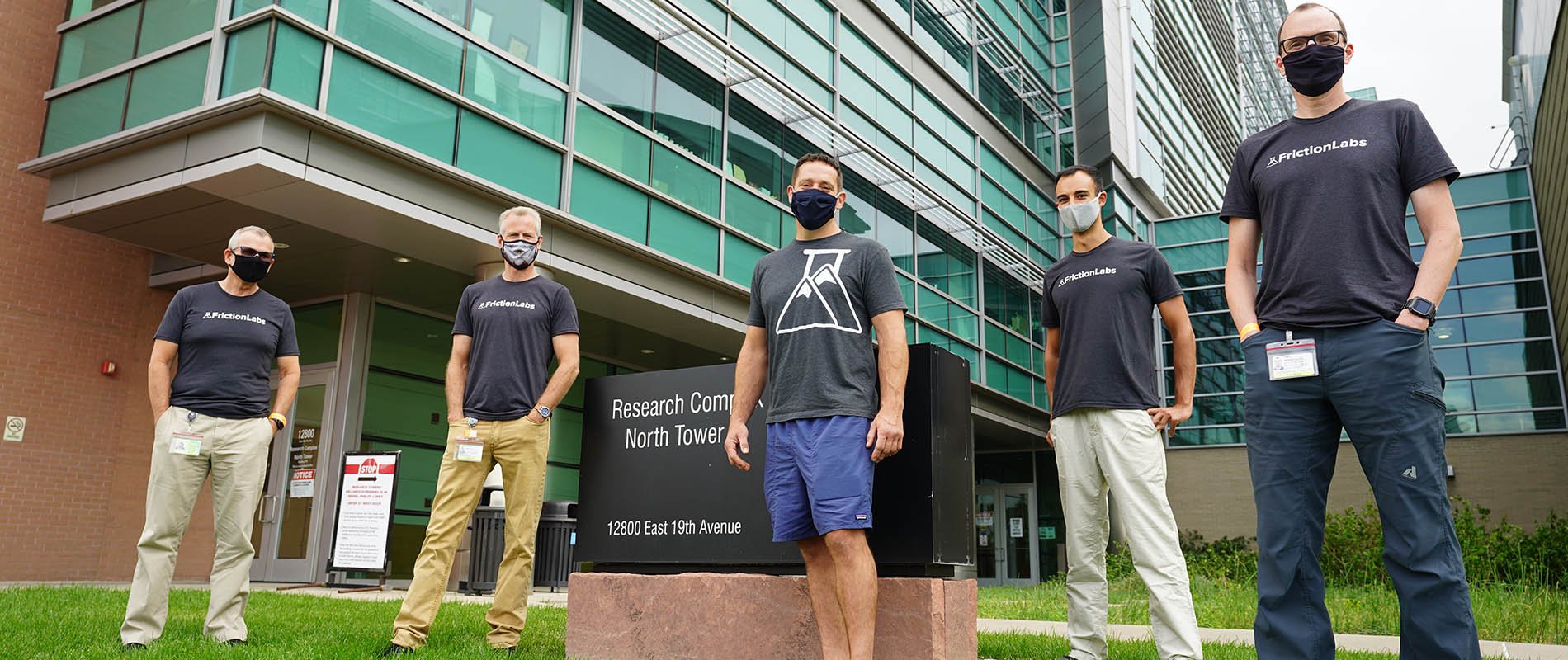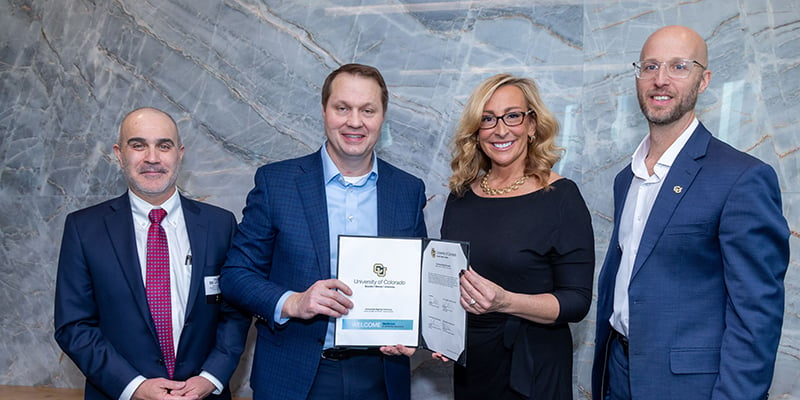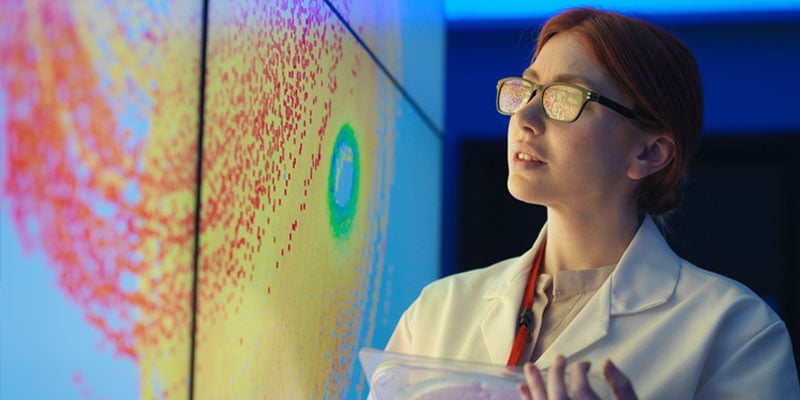Editor’s note: “Our COVID-19 Fighters” is an occasional series highlighting the ways the CU Anschutz Medical Campus community is helping patients and the wider community in the fight against the pandemic. We welcome your story ideas; please share them here.
Fall semester. It’s typically a time of buzzing energy: students filling the hallways, huddling in study rooms and gathering for spike ball breaks at Boettcher Commons.
But fall has a decidedly different feel this year on the University of Colorado Anschutz Medical Campus.
Six months. We are almost 24 weeks deep since the invisible threat of SARS-CoV-2 turned 2020 upside down in the United States and beyond. Our daily lives are now marked by these numbers: 6-foot social distancing, at least 20-second vigilant hand scrubbing, high thread-count mask wearing and – should we dare – 24/7 news-cycle scanning.
Through it all, the CU Anschutz community has responded, launching a multi-front attack on the virus. Whether caring for patients in our hospitals, creating a contact tracing program, providing mental health services to our communities, or developing a coronavirus test in our backyard, the CU Anschutz community continues to rally to the front lines of the battle against the pandemic.

Several of the CU Anschutz students who reached out to the pandemic's most vulnerable population as part of an innovative new program.
How’s this for a number? More than 40 CU Anschutz students reached out to the pandemic’s most vulnerable population as part of an innovative program launched by the Division of Geriatric Medicine and its UCHealth Seniors Clinic.
Read this story and more in the “Our COVID-19 Fighters” series, which showcases the many ways CU Anschutz is helping patients and the wider community during the crisis. The pandemic has brought our campus’s missions of research, patient care, innovation and education into sharp focus.
Numbers again paint the picture: The volume of stories about how our talented, pioneering and dedicated people are rising to meet the COVID-19 challenge are almost too numerous to list. Here is a sampling from the last three months:
COVID-19: Innovations Under Duress
In March, CU Nursing’s Figaro Loresto and Scott Harpin (photo at top) asked themselves what they could do to help in the pandemic – one from a research perspective and the other from a “bedside” and public health perspective. Their unique skill sets have helped and continue to help fight the epidemic in myriad ways.
Podcast: CU Anschutz Experts Share Ups and Downs of Controlling a Pandemic
Other than halting it in its tracks, if experts on the University of Colorado Anschutz Medical Campus could wave a wand and change something about their battle against the coronavirus pandemic, it might be taking the politics out of the picture. Guiding state mandates, pondering back-to-school logistics, and prepping for the duo threat of a bad flu season provide enough challenges for the health experts, who have been working tirelessly for nearly six months now to control the spread of COVID-19.

Liquid Chalk Proven in CU Labs to Kill Coronavirus, Potentially Helping Gyms to Safely Reopen
The COVID-19 pandemic had Ross Kedl literally climbing the walls. So when a Colorado-based company needed help verifying the antiviral attributes of its liquid chalk product, Kedl jumped right in. Kedl, professor of immunology and microbiology at the University of Colorado School of Medicine, and two CU Anschutz Medical Campus colleagues ran an experiment whose outcome has significant health, economic and recreational implications.
Consulting Latin American Agribusiness on COVID-19 Response
The Center for Health, Work & Environment in the Colorado School of Public Health has partnered with Pantaleon, one of the largest agribusinesses in Latin America, since 2016. Leaning on the Center’s expertise, Pantaleon established COVID-19 testing-based screening strategies in conjunction with updated screening strategies at each of its operations in six countries.

Free CU Anschutz COVID-19 Antibody Tests to Fuel Diabetes Study
Using a high-quality antibody test produced within their own walls, researchers at the Barbara Davis Center for Diabetes (BDC) aim to answer questions about COVID-19’s effect on their patients – including whether SARS-CoV-2 can trigger one of the nation’s top chronic diseases.
CU Nursing Student Helps Sew 600 Masks and Volunteers at Homeless Shelter
Volunteering is in Carrie Brouillette’s nature. During the COVID-19 pandemic, the nursing student has marshaled her neighbors to donate fabric and created a mini assembly line to make cloth masks. They churned out about 600 cloth masks in their makeshift in-home manufacturing facility. Additionally, Brouillette has volunteered at a homeless shelter with the intent of learning how to be a better nurse.

Woman Duo Creates COVID-19 Contact Tracing Program
In an effort to keep their campus safe, two women on the University of Colorado Anschutz Medical Campus joined forces in creating a program aimed at preventing COVID-19 outbreaks in their community. So far a success, the pair’s model has gained attention from campuses across the state.
READ MORE
We hope you enjoy reading the “Our COVID-19 Fighters” stories.
See even more here.
When researchers from the University of Colorado Anschutz Medical Campus used a combination of two specific blood-clotting tests, they found critically ill patients infected with COVID-19 who were at high risk for developing renal failure, venous blood clots, and other complications associated with blood clots, such as stroke.
Mental Health Crisis Is the Next Wave of Pandemic
Experts on the University of Colorado Anschutz Medical Campus are bracing for a predicted next wave of the COVID-19 pandemic – a mental health crisis. In anticipation of the surge, mental health providers are casting a wide net of support resources to the multitudes whose lives have been upended in unprecedented ways.

From Selfies to Being Seen: Doctor Honors Women of Color on Front Lines
In the early days of the pandemic, when many people worried about where to find toilet paper, Sarah Rowan, MD, had deeper concerns. Rowan appreciated the sudden spotlight on frontline medical providers – they graced magazine covers and even large murals – but she noticed something was missing. “It made me think, ‘Why do you never see women of color in the media as a picture of a doctor or any healthcare provider?’” she said.
Program Connects Students With COVID-19’s Most Vulnerable
For Kristina Slunecka, it was the woman locked down in her assisted-living facility room, unable to leave the confines of her four walls even to go outside because of COVID-19. For Desirae Martinez, it was the elderly man beginning their first call with, “I don’t have much to say,” and still chatting with his newfound friend an hour later. The women were two of about 40 University of Colorado Anschutz Medical Campus students who reached out to the pandemic’s most vulnerable population as part of an innovative program.

CU Anschutz Researchers Roll Out Antibody Test
A one-of-a-kind antibody test targeting the novel coronavirus has joined the arsenal of tools needed in understanding and eradicating COVID-19. The test, described as “among the best of the best,” emerges from an also unique partnership between UCHealth and the University of Colorado Anschutz Medical Campus, a joint venture researchers hope will serve as a catalyst for future projects.



